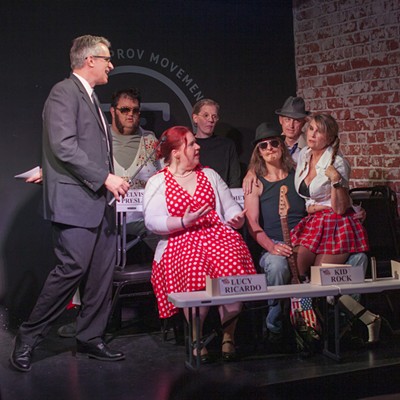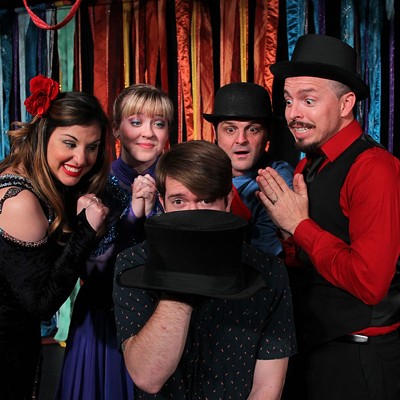Here we are standing on the corner of 'Walk, Don't Walk,' waiting for these aliens to show up . . . you're thinking I'm crazy. You think I give a hoot? You people look at my shopping bags, call me crazy 'cause I save this junk. What should we call the ones who buy it?"
And so we are introduced to Trudy, our "crazy" but remarkably insightful tour guide in The Search for Signs of Intelligent Life in the Universe. Jane Wagner's one-actress-but-multi-character script, which she wrote for Lily Tomlin, is now onstage at Live Theatre Workshop. It features Carley Elizabeth Preston, who morphs into more than a dozen characters as the "search" ensues, giving us a peek into our pre-millennial sensibilities. It is a brilliant piece of writing, wickedly funny, incisive and thoughtful, and although it's 28 years old and is often dated in its references, the heart of the script still beats loudly.
Tomlin won the Tony Award for Best Actress for her embodiment of these characters, who reflect the patchwork, frayed and far-from-whole-cloth fabric of our lives in the late 20th century.
There's Chrissy, a chatty young woman of few skills and even less direction, who spends hours working out every day; there's Paul, her counterpart at the health club, who wonders what the point is of being a health nut by day and a coke head by night. There's teenage Agnus Angst (with "hair the color of FrootLoops," observes Trudy), whose contempt for everyone is only matched by her not-so-disguised contempt for herself. She derisively addresses everyone as "Specks" and seeks help from a radio therapist she calls from the bathroom at IHOP. Her clueless grandparents, Marie and Lud, now seem to have inherited the job of raising Agnus, because her parents have locked her out of the house, but they have nothing in common with Agnus except that they are "carbon-based life forms." There's jaded, upper-crust socialite Kate, who wonders if one can actually die of boredom. Given a radical haircut by her stylist, who thinks he is a performance artist, she is "sick of being a victim of trends I reflect but don't even understand."
Then there are Tina and Brandy, ladies of the night who are frequently interviewed by writers who pay them to talk about their lives. And there are Edie, Marge, Lyn and Pam, who have grown into adulthood in the bosom of the women's movement—and have the Gloria Steinem-autographed copies of Ms. magazine to prove it. They explore a new world in which they experiment with their sexuality, have children through artificial insemination by way of a turkey baster, and date sensitive men. In particular, we get to know Lyn, whose journal reveals much about her life with Bob, who gave her a geodesic dome kit for a wedding present and with whom she had twin boys. We witness her struggle with the stresses of her job and marriage and parenthood: "If I'd known this would be what it's like to have it all, I might have been willing to settle for less."
We get a glimpse of all these folks who give us flashes of the way we were courtesy of Trudy, whose umbrella hat—which she claims she invented—picks up signals from others' electromagnetic fields. Through it all, Trudy tries to help her alien visitors understand our world, and in the process we get a few insights about our world as well.
Wagner, who won a New York Drama Critics Special Award for this piece, has written much of Tomlin's material over the years. She's also written screenplays and TV scripts, winning several Emmys and a Peabody Award. The two have been partners for 42 years, and are actually considering marriage, now that it is (again) legal in California.
Preston is charged with a huge responsibility in this two-hour piece, and the good news is that—although lacking the finesse to totally become all these characters, each in a vivid, unique and deep way—she represents them well enough that we understand who's who, and we get a strong enough sense of who they are that Wagner's wonderful creations come to heartfelt life. I hope Preston can relax a bit more into these personas, sink into them, trusting the solid work she's done. Now, things feel rushed, and although director Sabian Trout is right to keep things moving, there are some moments that need to spread out, so that we can sink into them as well.
The set is simple, a blank slate, really, and Preston uses no props. Light and sound are really important to giving us a sense of things. But the sound is problematic. It often is at LTW. Whether it's the lack of good speakers or their placement, I don't know. And the theater itself is such a small space, you certainly don't want the sound to overpower. I think John Millerd's sound design was good and supported the spirit of the piece and, importantly, its many transitions, but it was barely decipherable a lot of the time.
Trudy makes so many wonderful observations—she is sort of a modern day take on an Old Testament prophet—that even though laughs abound, there is plenty to chew on. When she tries to help her alien visitors understand concepts like "lunch time" and "goose bumps," we get an outsider's attempt to understand who we are and what we're about. For example, in one hand Trudy holds a can of Campbell's tomato soup, and in the other, a picture of Andy Warhol's famous painting. "This is soup," she says about the can. "This is art," she says about the Warhol. Hmmm.
The star of the evening is Wagner's fine script. And in a huge undertaking, Preston capably interprets it. It's a fun, inventive and intelligent evening of theater.










